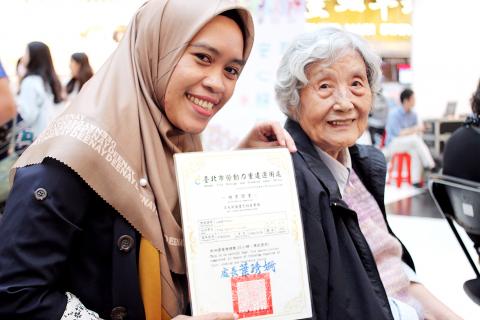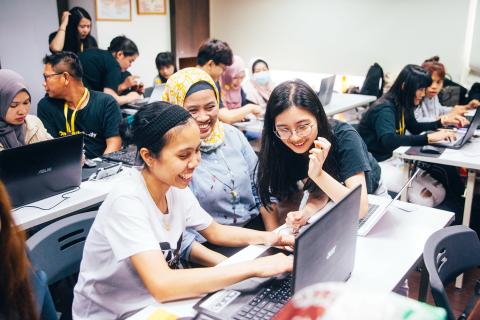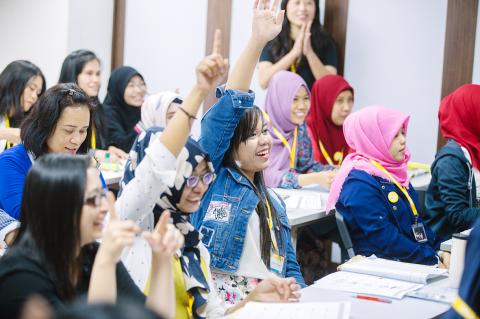On a recent Sunday afternoon, domestic helper Tina Agnesh Lusiana wheels the elderly woman whom she takes care of into Taipei Main Station to witness her graduation ceremony.
The 34-year-old from Indonesia has just finished a course in dementia care and healthy cooking organized by the Taipei City Government’s Foreign and Disabled Labor Office. Her “grandmother” is eager to celebrate the achievement. Despite a 60-year gap, employer and employee share a bond not immune to the familiar refrains of maternal affection.
“She tells me to quickly go home, find a boyfriend and get married,” Lusiana says, laughing.

Photo: Davina Tham, Taipei Times
With her employer’s support, Lusiana used her weekly day off to attend the free lessons, which took place over three Sundays earlier this year. But not every foreign worker has the same prerogative.
Foreign domestic workers in Taiwan do not have a weekly mandatory rest day, despite this being a global standard already enforced in Hong Kong and Singapore. According to statistics by the Ministry of Labor (MOL), 34.7 percent of foreign domestic workers did not receive any days off last year.
The record is a strike against Taiwan’s achievements in human rights and freedoms for its own citizens, especially stark after the internationally-lauded legalization of same-sex marriage in May. It also hinders the ability of foreign domestic workers to take advantage of growing opportunities provided by the government and civil society for training and education.

Photo Courtesy of One-Forty
WORK AROUND THE CLOCK
There’s been no turning back since Taiwan officially opened the gates to foreign workers in 1989. More than 700,000 were working here at the end of last year, over a third of whom were domestic helpers or care-takers.
Foreign domestic workers are not protected by the Labor Standards Act, which prescribes two regular days off every seven days. Instead, employers are encouraged to execute labor contracts based on templates provided by the workers’ home governments, available on the Web site of the Workforce Development Agency’s Direct Hiring Service Center.

Photo courtesy of One-Forty
Contract templates from Indonesia, the Philippines, Thailand and Vietnam all stipulate that a worker is to receive one day off every seven days. If asked to work on her day off, she is entitled to overtime pay. But without legal force to these recommendations, the reality is that many employers take advantage of gaps in labor protections.
A survey conducted by the Garden of Hope Foundation (勵馨基金會, GOHF), a non-governmental organization, found that over three months from March to May this year, 28.43 percent of domestic foreign workers did not receive a single day off.
Compounding the lack of rest days are the long work hours — an average of 17.72 hours a day, according to a separate study commissioned in 2012 by the Executive Yuan’s Research, Development and Evaluation Commission (now part of the National Development Council).

Photo: Davina Tham, Taipei Times
Of 1,076 respondents, 215 considered themselves to be working or on call 24 hours a day.
In 2011, the former Council of Labor Affairs (since upgraded to the MOL) drafted a comprehensive domestic worker protection bill that stipulated wages and days off. But it was shelved after being sent to the Executive Yuan for review.
The lack of rest and even basic privacy can cause mental and emotional strain to workers — effects that have already been reported to the government. A 2013 Control Yuan investigation into human rights issues faced by foreign domestic workers found that the lack of regular days off caused workers to fall into states of anxiety and stress in the long-term, and recommended that employers build “breathing time” for workers into their contracts.

Photo courtesy of One-Forty
“The [MOL] is essentially shirking its responsibilities,” wrote Chi Hui-jung (紀惠容), chief executive of GOHF, in an editorial for the Taipei Times earlier this month. “Taiwan probably has a long way to go before reaching that goal [of fair treatment for foreign domestic workers.]”
HELP WANTED
It’s Sunday, and Gloria Abucay and Raquel Costales, Filipino domestic helpers working in Taiwan for six and 11 years respectively, are meeting friends after attending mass at St Christopher’s Church on Taipei’s Zhongshan North Road (中山北路).
The area, informally known as Little Manila, is a one-stop destination with supermarkets, remittance centers and food and clothing shops to meet the needs of overseas Filipino workers. The concentration of services along this short stretch of road seems to illustrate the limited time that many foreign workers have to perform religious obligations as well as personal errands.
Both women tell the Taipei Times they know many other helpers who do not get any days off because they have to tend to round-the-clock needs as live-in care-takers.
Abucay recalls a previous employer who limited the amount of time she could spend outside on her day off from 8am to 4pm.
Even when employers are willing to grant days off, many domestic helpers consider them too costly to take every week, given their low salaries and the high agent fees they may still be paying. Both Abucay and Costales limit their days off to just one Sunday a month in order to avoid losing their overtime pay of NT$567 per day. Abucay, who earns NT$17,000 per month before overtime, says the cost of even one extra day off is “expensive.”
On average, foreign domestic workers earn a total monthly salary with overtime amounting to NT$19,927, according to the MOL. In contrast, the average monthly salary for a Taiwanese domestic helper or care-taker in the Taipei area ranges from NT$45,000 to NT$75,000, according to the China Long-term Care Association (中華長照協會).
Aside from care-taking needs, some employers do not allow their domestic helpers to take a day off outside because of paranoia about how they spend their free time, says Kevin Chen (陳凱翔), co-founder of One-Forty, a non-profit that runs classes for migrant workers.
“There is a stereotype that if [a foreign domestic worker] goes out she will befriend bad company, or run away” and break her contract, Chen says.
But Chen says that employers suffer unintended consequences too, as their employees’ well-being impacts the quality of care they can provide.
“Good-quality care can only come from a care-taker who is in good shape herself,” he says.
SUNDAY SCHOOL
Flying in the face of negative ideas about how they spend their days off, foreign workers are taking part in a growing number of education and training opportunities and giving back to society.
One-Forty, established in 2015, seeks to empower foreign workers to better manage their personal goals and finances and find more rewarding employment when they leave Taiwan. (Foreign laborers can work in Taiwan for an accumulated 12 years, while only certified care-takers can apply for an extension to 14 years. Contrast this with white collar workers who can apply for permanent residency after working in Taiwan for five years.) The non-profit has served more than 900 foreign workers with a focus on Mandarin and business management classes.
This summer, the Taipei City Government also introduced its inaugural season of free classes for foreign workers. Over 200 students enrolled in 15 classes covering Mandarin, dementia care, healthy cooking, hair-styling and cosmetology.
Hair-styling instructor Lien Shu-yuan (連淑媛) says her students not only diligently attended their classes, but also used their time off to volunteer with her and give free haircuts at nursing homes.
Benefits to employers are not lacking either. The curriculum for dementia care goes toward national policy guidelines introduced in June last year, under which the government is investing NT$9 billion (US$300 million) to achieve dementia care, treatment, prevention and research targets by 2025.
“By helping our migrant workers to learn different skills, the ones who benefit in the end are actually our own local families,” says Yeh Hsiu-shan (葉琇姍), director of the Taipei City Government Foreign and Disabled Labor Office, adding that a new season of free classes would open next year.
At One-Forty, new students receive notes addressed to their employers explaining what they are doing in class and how the employers themselves can benefit, such as through improved communication in Mandarin. Even then, Chen says that One-Forty has still encountered “a minority” of employers who forbid their helpers from attending classes.
The overt messaging to employers ultimately underscores the tensions underlying the current state of affairs, which relies on showing employers how a day off for their domestic helpers will serve their own needs. Without legal protections, it takes persuasion and imagination to enforce the basic right of days off for foreign domestic workers.
For now, civil society and individual workers are coming up with their own solutions to work around the constraints.
This summer, One-Forty launched a set of Mandarin textbooks and YouTube tutorial videos designed for distance learners. Foreign workers who do not have days off or who are based far away from Taipei can apply to receive the free learning materials via post, follow the tutorials online, submit assignments and even ask their teachers questions through an exclusive Facebook group.
One-Forty has so far received about 2,600 applications and sent out over 1,000 sets of textbooks. To their surprise and delight, they have also heard reports of groups of domestic helpers sharing a single set of materials among themselves, much like a community library. The group aims to launch the textbooks in Tagalog next year.
And while her own employer does not suffer from dementia, Luisana knows other domestic helpers in her neighborhood taking care of elderly who do. She makes sure to share materials from her dementia care classes with those who do not have a day off.
Lusiana herself is aware that her weekly day off puts her in a privileged position among peers. She tries to share that fortune. While her own employer does not suffer from dementia, she knows other domestic helpers in her neighborhood taking care of elderly who do, and she makes sure to share her newfound knowledge with them.
“What I learn, I also teach to my friends, because they are the ones who do not have days off,” she says.

The following three paragraphs are just some of what the local Chinese-language press is reporting on breathlessly and following every twist and turn with the eagerness of a soap opera fan. For many English-language readers, it probably comes across as incomprehensibly opaque, so bear with me briefly dear reader: To the surprise of many, former pop singer and Democratic Progressive Party (DPP) ex-lawmaker Yu Tien (余天) of the Taiwan Normal Country Promotion Association (TNCPA) at the last minute dropped out of the running for committee chair of the DPP’s New Taipei City chapter, paving the way for DPP legislator Su

My previous column Donovan’s Deep Dives: The powerful political force that vanished from the English press on April 23 began with three paragraphs of what would be to most English-language readers today incomprehensible gibberish, but are very typical descriptions of Democratic Progressive Party (DPP) internal politics in the local Chinese-language press. After a quiet period in the early 2010s, the English press stopped writing about the DPP factions, the factions changed and eventually local English-language journalists could not reintroduce the subject without a long explanation on the context that would not fit easily in a typical news article. That previous

It’s hard to know where to begin with Mark Tovell’s Taiwan: Roads Above the Clouds. Having published a travelogue myself, as well as having contributed to several guidebooks, at first glance Tovell’s book appears to inhabit a middle ground — the kind of hard-to-sell nowheresville publishers detest. Leaf through the pages and you’ll find them suffuse with the purple prose best associated with travel literature: “When the sun is low on a warm, clear morning, and with the heat already rising, we stand at the riverside bike path leading south from Sanxia’s old cobble streets.” Hardly the stuff of your

Years ago, I was thrilled when I came across a map online showing a fun weekend excursion: a long motorcycle ride into the mountains of Pingtung County (屏東) going almost up to the border with Taitung County (台東), followed by a short hike up to a mountain lake with the mysterious name of “Small Ghost Lake” (小鬼湖). I shared it with a more experienced hiking friend who then proceeded to laugh. Apparently, this road had been taken out by landslides long before and was never going to be fixed. Reaching the lake this way — or any way that would